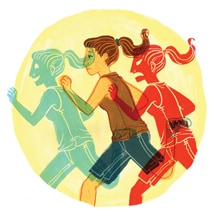SOMETIMES THE HARSHEST CRITIC IS THE ONE IN YOUR HEAD
STORY BY Heather Kirk-Davidoff ILLUSTRATION BY Kelly Miller
When I received a Kindle Fire for Christmas last year, I immediately got hooked on playing Scrabble online. I discovered friends from high school, members of my congregation and my sister-in-law all engaged in this virtual competition. I started online games with all of them, but soon discovered that my desire to beat my human opponents was eclipsed by my desire to make the little “Teacher” icon on my screen happy.
engaged in this virtual competition. I started online games with all of them, but soon discovered that my desire to beat my human opponents was eclipsed by my desire to make the little “Teacher” icon on my screen happy.
After every turn, the Teacher icon reacts with a beaming smile if I play the word he would have played (and he always knows the best word), a polite grin if I did okay for a mere mortal or a sullen stare if I made only a passing effort. If I really screw up, the Teacher reacts in horror and looks like he is going to be sick.
I have fallen into the habit of beginning my day by playing my turn in the 6-8 Scrabble games I have going at any given moment. I do my best to get a few smiles from the Teacher. If I get a big grin, I’ve noticed that there’s a bit of a spring to my step as I head into work. If I get the look of disgust, I’ve noticed it can take me a few hours to recover my sense of confidence. All this from an icon on a screen!
The Scrabble Teacher is hard to please, but many of us have even less compassionate teachers in our heads. A few months ago, I was listening to my daughter, Rosa, practice her violin. As she struggled to  play a difficult passage she began talking to herself. “No, Rosa! You can do better than that! Play it again!” “That’s not it! Slow it down and try again!” As she tried again and again, her comments to herself became more disparaging. “You’re losing focus, Rosa! You’re being sloppy!” I eventually knocked on her door and suggested it was time to take a break and return to the passage later. I knew the “teacher” in Rosa’s head wasn’t going to give her permission to rest so I felt like I should.
play a difficult passage she began talking to herself. “No, Rosa! You can do better than that! Play it again!” “That’s not it! Slow it down and try again!” As she tried again and again, her comments to herself became more disparaging. “You’re losing focus, Rosa! You’re being sloppy!” I eventually knocked on her door and suggested it was time to take a break and return to the passage later. I knew the “teacher” in Rosa’s head wasn’t going to give her permission to rest so I felt like I should.
Rosa’s conversation with herself inspired a discussion topic for our church Youth Group the following Sunday. “Do any of you talk to yourself inside your heads?” I asked the group. Every single hand went up and the stories tumbled out. “When I’m working out at the gym,” one of our young athletes told the group, “I really yell at myself. I say, do you call that an effort? You’re pathetic! Work harder!” A much younger boy responded, “When I’m losing in tennis, I try to give myself a pep talk. I say to myself, ‘You’re a champion!'” I wondered out loud which internal voice gets better results.
That’s when I discovered that Rosa does more than berate herself for mistakes on the violin. She told the Youth Group, “Sometimes when I’m playing a game on the computer, and I get a bunch of points, I say little things to myself.” The group was intrigued and pressed Rosa for details. “Well…” she said, a bit embarrassed, “sometimes I say, Oooooooh YEAH! Rosa’s in the HOUSE!”
The kids almost fell off their chairs laughing. But later, we all agreed to try the same technique. When I finally cleared out my e-mail inbox the next day, I gave it a try. “Heather’s in the HOUSE!” I shouted to my empty office. It felt surprisingly good.
We all carry a “teacher” around inside. That voice may be an echo of a former teacher, especially one who may have been critical. But a scolding teacher who threatens to rap our knuckles with a ruler rarely gets the best results from students. As adults, it turns out, we have the ability to do what we always wanted to do as children and tell that nasty teacher to kiss off. That teacher doesn’t have tenure in your mind. Even so, it takes effort to show him or her to the door.
Here’s what we did with the Youth Group: Each kid wrote on an index card some words they’d like to hear from a teacher. For some this was easy, but for others it proved a real challenge. Responses ranged from “You are awesome!” to “I know you’re trying your best.” Next, the kids took their cards home and taped them to their mirrors, put them inside their school binders or carried them in their pockets. Then, whenever they started to berate themselves, they could look at the card. They could tell the critical teacher in their heads to shut up and let the encouraging one get a word in for a change.
It’s a simple practice, and we all felt a bit foolish doing it. But to the surprise of both the kids and the adult leaders, it had an effect. Some of us ended up writing extra cards and posting them in more places. But best of all, some found ourselves repeating our words to someone else who seemed to need encouragement. By the end of the week, our teacher was beaming. *




